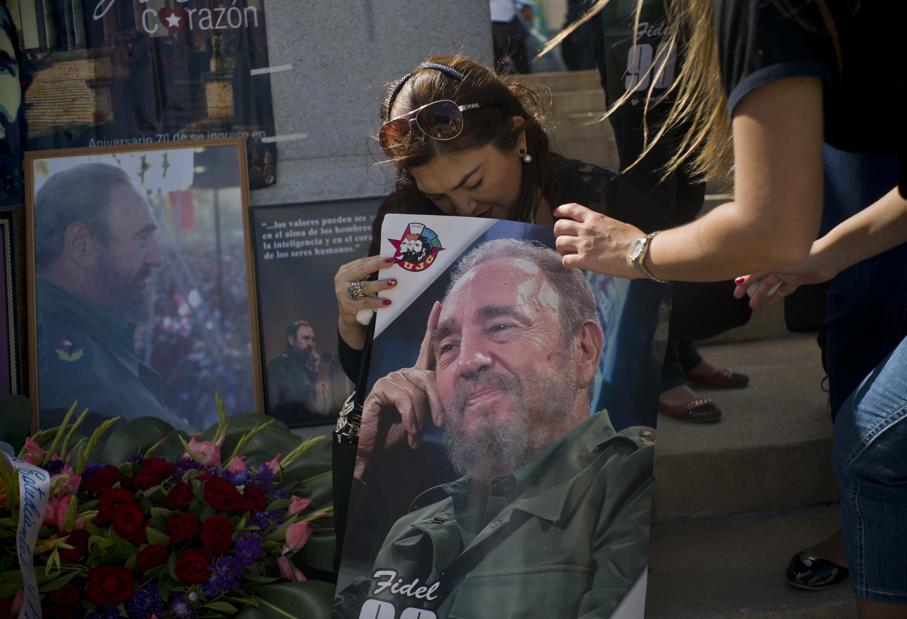
HAVANA — The nightclubs shut down early. Police officers and soldiers were on patrol as crowds of young people, dressed for a night out, spilled into the darkened streets.
Some had already been told the news, called by loved ones watching state television at home. Some were just finding out, their cellphones pressed to their ears as they absorbed what happened.
Others still did not know — Fidel Castro had died.
By sunrise, flags all over this vibrant, confounding capital had been lowered to half-staff. Young and old gathered in small groups — military officers in green fatigues, grandmothers mopping doorways, night watchmen finishing a surprising shift — and where there might have normally been laughter or yelling, whispers filled the void.
Cuba’s epic revolutionary in green fatigues, at the age of 90, had finally departed, and within a day, much of Havana seemed uncertain about exactly how to feel, or at least how to talk about it. Indifference and relief confronted sorrow and surprise as the conflicts that characterized Fidel Castro in life continued to reverberate in the aftermath of his death.
“He was the only leader I ever knew,’’ Graciela Martinez, 51, said as she mopped the floors of a cafe near the US Embassy on Saturday morning. She paused, then began to weep, thinking of her own father who fought for the Revolution — and of her relatives who had fled to the United States.
“For those who loved him, he was the greatest,’’ she said. “For those who hated him, there was no one worse.’’
The news of Cuba’s memorial plans spread quickly. He was to be cremated Saturday. There would be a two-day period of public mourning in Havana on Monday and Tuesday, and then a procession over the course of the week, with the revolutionary’s ashes moving across the country from Havana to the city known as the cradle of the Revolution, Santiago de Cuba, where he would be put to rest Dec. 4.
These details were safe; they could not be argued about and they were much repeated in conversation. But some Cubans also wanted to know what was going on in Miami and in Washington.
Even though Cuba would not change just because Castro was gone — it has been a decade since he ran the country — they said they wondered how the world would react and whether his death would accelerate the shifts already underway.
Other divides may also become more visible, especially between generations. Castro molded the country and governed it for so long that many older Cubans can hardly think of the nation apart from his legacy.
But he has also been out of the national spotlight for so long (after handing power to Raúl Castro in 2006) that many young Cubans have had little exposure to him, and do not seem to identify with him.
Even in the immediate response to Castro’s death, the gap could be heard and felt. Soon after the televised speech by Raúl Castro announcing that “El Comandante’’ had died, a crowd of young people clustered around the Salon Rojo, one of Havana’s most popular nightspots, where the reggaeton usually blares into the early-morning hours.
The music had stopped abruptly and as police waved along women in miniskirts and men with gelled mohawks, no one was weeping. No one was chanting. Some said the country would be better off, freer now, though they said it quietly, wary that someone might overhear such hopes. A hearse, repurposed as a taxi, happened to drive by.
“Take him with you,’’ one of the young men shouted with a smile as a friend cheered him on. The young women with them looked embarrassed, but not angry.
A few feet away from one crowd of partygoers, three neighbors, each in their 50s and consoling one another, stood in their apartment building’s doorway facing the iconic Hotel Nacional.
Concepcion Garcia, 55, looked at the young people around her with disappointment. “What a rich experience we have had, to live the two periods of Cuba — capitalism and socialism,’’ she said. “Imagine how we Cubans feel. The most precious thing we have just died.’’
She removed her glasses and pointed at her eyes.
“I have the revolution and Fidel to thank for this cataract surgery,’’ she said, adding that she would not have been able to afford the procedure without Cuba’s socialized medical care. It did not cost her 1 cent, she said.
“He put Cuba on the map,’’ Garcia added, “and the world has recognized that.’’
For many, Castro’s death, despite being so long foretold and so often rumored in recent years, nonetheless came as a surprise.
“There are still hours to come for the first sunrise without Fidel Castro that I have ever lived in my life,’’ Yoani Sánchez, a Cuban activist and blogger, said in a Twitter message.
Francisco Rodríguez Cruz, 46 and a prominent blogger and gay activist who supports the revolution, was one of many who said that losing Castro was like losing a parent.
“With this death, you feel that your own life is spread before you,’’ Cruz said in Havana.
“It is a very strange feeling.’’



